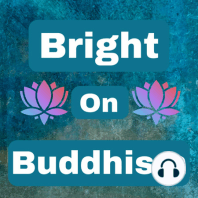23 min listen

Research Series episode 2 - Philosophy and Ecology in "The World of Living Things" by Imanishi Kinji 今西錦司
Research Series episode 2 - Philosophy and Ecology in "The World of Living Things" by Imanishi Kinji 今西錦司
ratings:
Length:
48 minutes
Released:
Nov 18, 2022
Format:
Podcast episode
Description
Bright on Buddhism Research Series episode 2 - Philosophy and Ecology in "The World of Living Things" by Imanishi Kinji 今西錦司
Hello and welcome to a new type of episode of Bright on Buddhism. In this series, I will be presenting and discussing some of my own original research, which covers a broad range of topics in Japanese Buddhism, and discussing it in the context of East Asian Buddhism and other disciplines broadly.
Resources: Asquith, Pamela. “Imanishi’s Impact on Japan.” Nature 323, no. 6108 (October 1986): 676–676.;Asquith, “Sources for Imanishi’s Views of Sociality and Evolutionary Outcomes.” Journal of Biosciences 32, no. 4 (2007): 635–41.; Buswell, Robert E., ed. Encyclopedia of Buddhism. New York: Macmillan Reference, USA, 2004.; Gethin, Rupert. “Cosmology.” In Encyclopedia of Buddhism, edited by Robert E. Buswell, 809–10. New York: Macmillan Reference, USA, 2004.; Girard, Frederic. “Crisis and Revival of Meiji Buddhism.” International Inoue Enryo Research 2 (2014): 19.; Godart, G. Clinton. Darwin, Dharma, and the Divine. Honolulu, HI: University of Hawai’i Press, 2017.; Godart, Gerard Clinton. “‘Philosophy’ or ‘Religion’? The Confrontation with Foreign Categories in Late Nineteenth-Century Japan.” Journal of the History of Ideas 69, no. 1 (2007): 71–91. https://doi.org/10.1353/jhi.2008.0008.; Hajime, Tanabe, David Dilworth, and Taira Satō. “The Logic of The Species as Dialectics.” Monumenta Nipponica 24, no. 3 (1969): 273–88. https://doi.org/10.2307/2383635.; Halstead, Beverly. “Anti-Darwinian Theory in Japan.” Nature 317, no. 6038 (October 1985): 587–89. https://doi.org/10.1038/317587a0.; Kinji, Imanishi. The World of Living Things, edited by Pamela Asquith, translated by Pamela Asquith, Shusuke Yagi, Heita Kawakatsu, and Hiroyuki Takasaki, i–xxv. London: RoutledgeCurzon, 2001.; Klautau, Orion. “(Re)Inventing ‘Japanese Buddhism’: Sectarian Reconfiguration and Historical Writing in Meiji Japan.” The Eastern Buddhist 42, no. 1 (2011): 75–99.; Kopf, Gereon. “Between Identity and Difference Three Ways of Reading Nishida’s Non-Dualism.” Japanese Journal of Religious Studies 31, no. 1 (2004): 73–103.; Of Heretics and Martyrs in Meiji Japan, 1993. https://press.princeton.edu/books/paperback/9780691024813/of-heretics-and-martyrs-in-meiji-japan.; Smuts, Jan Christian. “General Concept of Holism.” In Holism and Evolution, 3rd ed., 84–120. London: MacMillan and Co, 1936.; 今西錦司. 生物の世界, 1941.; 日本哲学史フォーラム. 日本の哲学・第3号・特集・生命. 日本の哲学 3. Tokyo: 昭和堂, 2002.; 野家啓一. “主体と影響の生命論.” In 日本の哲学・第3号・特集・生命, 29–51. 日本の哲学 3.Tokyo: 昭和堂, 2002.
Do you have a question about Buddhism that you'd like us to discuss? Let us know by finding us on email or social media! https://linktr.ee/brightonbuddhism
Credits:
Nick Bright: Script, Cover Art, Music, Voice of Hearer, Co-Host
Proven Paradox: Editing, mixing and mastering, social media, Voice of Hermit, Co-Host
---
Send in a voice message: https://podcasters.spotify.com/pod/show/brightonbuddhism/message
Hello and welcome to a new type of episode of Bright on Buddhism. In this series, I will be presenting and discussing some of my own original research, which covers a broad range of topics in Japanese Buddhism, and discussing it in the context of East Asian Buddhism and other disciplines broadly.
Resources: Asquith, Pamela. “Imanishi’s Impact on Japan.” Nature 323, no. 6108 (October 1986): 676–676.;Asquith, “Sources for Imanishi’s Views of Sociality and Evolutionary Outcomes.” Journal of Biosciences 32, no. 4 (2007): 635–41.; Buswell, Robert E., ed. Encyclopedia of Buddhism. New York: Macmillan Reference, USA, 2004.; Gethin, Rupert. “Cosmology.” In Encyclopedia of Buddhism, edited by Robert E. Buswell, 809–10. New York: Macmillan Reference, USA, 2004.; Girard, Frederic. “Crisis and Revival of Meiji Buddhism.” International Inoue Enryo Research 2 (2014): 19.; Godart, G. Clinton. Darwin, Dharma, and the Divine. Honolulu, HI: University of Hawai’i Press, 2017.; Godart, Gerard Clinton. “‘Philosophy’ or ‘Religion’? The Confrontation with Foreign Categories in Late Nineteenth-Century Japan.” Journal of the History of Ideas 69, no. 1 (2007): 71–91. https://doi.org/10.1353/jhi.2008.0008.; Hajime, Tanabe, David Dilworth, and Taira Satō. “The Logic of The Species as Dialectics.” Monumenta Nipponica 24, no. 3 (1969): 273–88. https://doi.org/10.2307/2383635.; Halstead, Beverly. “Anti-Darwinian Theory in Japan.” Nature 317, no. 6038 (October 1985): 587–89. https://doi.org/10.1038/317587a0.; Kinji, Imanishi. The World of Living Things, edited by Pamela Asquith, translated by Pamela Asquith, Shusuke Yagi, Heita Kawakatsu, and Hiroyuki Takasaki, i–xxv. London: RoutledgeCurzon, 2001.; Klautau, Orion. “(Re)Inventing ‘Japanese Buddhism’: Sectarian Reconfiguration and Historical Writing in Meiji Japan.” The Eastern Buddhist 42, no. 1 (2011): 75–99.; Kopf, Gereon. “Between Identity and Difference Three Ways of Reading Nishida’s Non-Dualism.” Japanese Journal of Religious Studies 31, no. 1 (2004): 73–103.; Of Heretics and Martyrs in Meiji Japan, 1993. https://press.princeton.edu/books/paperback/9780691024813/of-heretics-and-martyrs-in-meiji-japan.; Smuts, Jan Christian. “General Concept of Holism.” In Holism and Evolution, 3rd ed., 84–120. London: MacMillan and Co, 1936.; 今西錦司. 生物の世界, 1941.; 日本哲学史フォーラム. 日本の哲学・第3号・特集・生命. 日本の哲学 3. Tokyo: 昭和堂, 2002.; 野家啓一. “主体と影響の生命論.” In 日本の哲学・第3号・特集・生命, 29–51. 日本の哲学 3.Tokyo: 昭和堂, 2002.
Do you have a question about Buddhism that you'd like us to discuss? Let us know by finding us on email or social media! https://linktr.ee/brightonbuddhism
Credits:
Nick Bright: Script, Cover Art, Music, Voice of Hearer, Co-Host
Proven Paradox: Editing, mixing and mastering, social media, Voice of Hermit, Co-Host
---
Send in a voice message: https://podcasters.spotify.com/pod/show/brightonbuddhism/message
Released:
Nov 18, 2022
Format:
Podcast episode
Titles in the series (100)
What is the Buddhist philosophy of speech, language, and words? by Bright On Buddhism